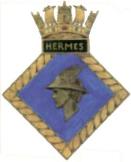HMS Hermes (1959) CV (10th) |
 |
|
This the tenth ship to carry the name HMS Hermes was the last of the Hermes Class (1953) to be
completed. She was ordered in 1943, laid down in Jun-1944, launched
16-Feb-1953, but not completed until 18-Nov-1959.
She was originally intended to be the same as her three sister ships, but many changes were made during her extended construction that she could be given a separate classification. One major difference was that she was completed with a semi-open hangar and the Royal Navy's second deck edge lift, the first being in HMS Ark Royal. Her first deployment was East of Suez in 1960. Then refit from Oct-61 to Oct-1962. After this she relieved HMS Ark Royal in the Far East. Another major refit followed from 1964-66. By the time she returned to the fleet her age meant she as having difficulty operating the latest heavy jets safely. But in 1967 she went to the Mediterranean and Far East until 1969. She returned to Portsmouth in 1970 to end her time as a fixed wing carrier. She underwent conversion from 1970 -Aug-1973 to be a Commando Carrier. In Apr-1980 the first of two Sea Harrier squadrons were formed with the intention that one would embark on each of the Navy's two remaining carriers. Hermes, Illustrious (1982), and Ark Royal (1985) being the only carriers intended to remain in the fleet, with one being in refit at any time. With HMS Invincible (1980) being sold. Tests during 1977-80 showed the benefit of having a ski-jump ramp to improved the Harriers payload carrying capability. So Hermes had a 12.5° ramp fitted. This was nicely in time for Apr-1982 when Argentina Invaded the Falkland Islands and Hermes went to war in the South Atlantic in company with HMS Invincible (1980), whose sale had not quite been completed. Hermes left Portsmouth on 05-Apr-1982 as Flagship of the Naval Task Force which successfully retook the Islands from invading Argentine Forces. She successfully operated Sea Harrier, and RAF Harrier aircraft plus numbers of helicopters. On 19-May it is believed that Hermes was the launching point for an operation which has never been admitted to by the Royal Navy. When a single Sea King HC4 helicopter launched, and staging through the patrol vessel Dumbarton Castle landed an SAS unit on Argentine soil to report enemy air activity. The Sea King continued on until its fuel was exhausted and landed on Chilean territory. Where the crew destroyed the aircraft and gave themselves up to the Chilean Authorities. Having first given the SAS troops time to dig in. The details would be due for release under the 30 year rule in 2012. But only time will tell if this happens. What is certain is that: Exactly what went on is up to the readers knowledge and whatever is released in due course of time. Appeared at the Silver Jubilee Review 1977. Hermes paid off in Apr-1986. Won the Battle Honour: Falkland Islands 1982.
|
Other HMS Hermes - Hermes Class (1953) CVL Outside Links |
|
This page last edited -
24 June, 2012.
Copyright © Ian M King, except where otherwise indicated. |
|